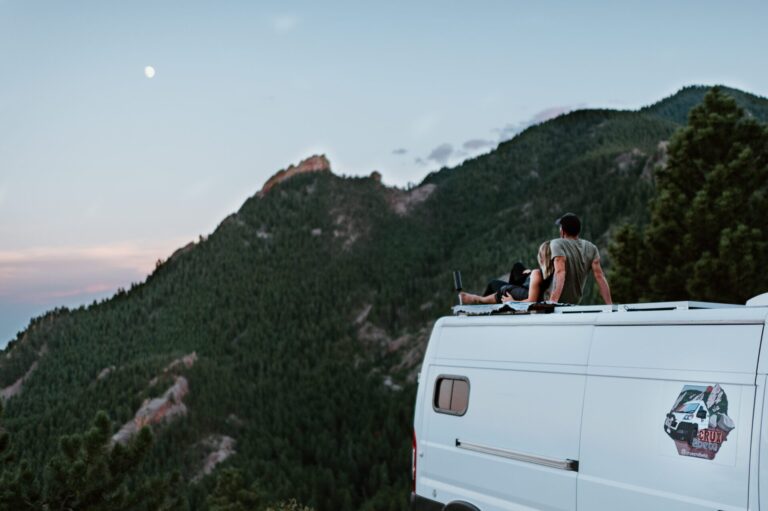
After living on the road for three years, we’ve learned a lot. We’ve learned so much about this lifestyle, ourselves, our relationship, and living on the road. We get asked questions like, “What’s your favorite or least favorite part about vanlife?” It’s not always quick or easy to answer this. People who are interested in this nomadic lifestyle are looking for wisdom so they will have fewer complaints of their own (hopefully) and avoid regret. At least that was true for us when we were in our research phase. We hated those “What I Hate About Vanlife” YouTube videos but we watched them anyway because we didn’t want that to be how we felt.
Now, after 3 years of living on the road, we can empathize with many of the complaints we heard about this lifestyle. But, we also roll our eyes at some of the criticisms we see or hear because they can be easily remedied with proper planning (read more about that in our previous blog). You have to decide what is important to you and your own life and decide what is best to include in your home. Create a space that is specific to your needs and if it turns out that it’s not, make some changes. Find priority in your happiness and put it above all else. We’d like to share with you some of the pros and cons of living full-time in a van while traveling. And if you roll your eyes at some of them—that’s okay!
PROS
Travel
We enjoy the freedom that this lifestyle can offer. We can choose to stay somewhere for as little or as long as we’d like. If there’s something we want to drive towards—we can do that. If there’s something we want to drive away from—we can do that too. We are also not tied to a strict route. Instead, we have a general sense of which state we want to head to depending on the time of year and then it’s “choose your own adventure” from point A to point B. We get to see new landscapes in areas we’ve never been before. It never gets old and it’s always exciting. I’m constantly searching “attractions” in my Google Maps to see what we should stop and see along our route. We no longer have the dreaded work commute – back and forth, wasting money and gas on the same old road. We spend more money when we travel long distances but then save on gas when we stay put in one area.
Weather
We try our best to coordinate the places we travel to with the weather. For example, we choose to be in areas like California or Arizona for winter so we can skip the snow. We are often in Colorado or Oregon for summer and do our best to avoid the extreme humidity. Every other year we’ve headed to the east coast for Fall to visit with family during ideal temperatures and leaf-peeping.
Family
We have family spread out across the U.S. in California, Texas, Tennessee, and New York. If we still worked regular 9-5 jobs with only two weeks of vacation, it would be almost impossible to visit any of our family. We are able to visit them all and make our rotations more easily because of our lifestyle and choice of work.
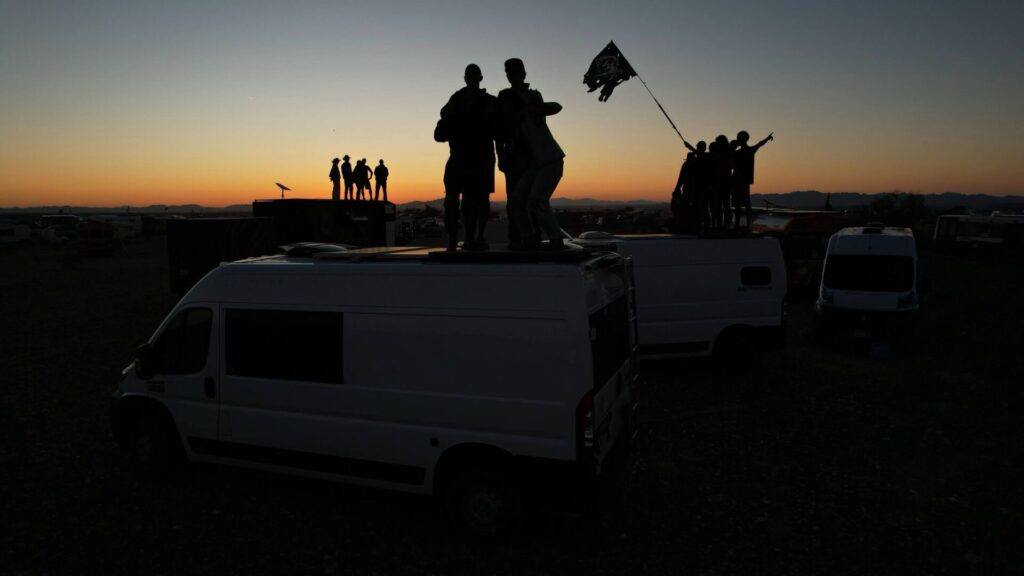
Community
As we travel around we are constantly meeting new friends who are also traveling. We meet new people as we see them parked places—there’s a mutual understanding of “if the door is open, come say hello”! We also meet up with internet friends we’ve been talking to on Instagram. We’ll post in our bio where we currently are and then where we plan on going next. This is useful for not only meeting up with friends but for finding work. We help others with their van builds and are able to reach more people as we keep traveling around. There are many ways to meet others or stay connected with current friends within the community. We use an app called Sekr which tells you who is within a certain amount of miles. We also take advantage of the iPhone “Find My Location” service and share it with other friends who have an iPhone. This way we can meet up again as we go about our travels. One of our favorite things about meeting friends on the road is getting to meet up again with them in a different state and reconnect like no time has passed at all.
Affordability
The stress of paying bills is a lot less while living this lifestyle. Of course, there will always be bills of some kind. We have a van payment and that is our “rent” but it is a lot less than we’d pay anywhere else. We don’t have a utility bill for power since we use solar panels and drive to charge our house batteries. We do have a pretty cheap gas bill and that’s our propane refill. Taking a rent payment out of the equation makes a huge difference in how much you need to work and how much money you need to make each month. This takes a lot of stress away from us and creates more happiness overall. We are able to flip the regular 5 days of work and 2 days of play to 5 days of play and 2 days of work each week.
Quality Time
Increasing our happiness individually and together as a couple was made possible when we switched over to vanlife. Not only are we working less and have found more time for the things we enjoy, but we spend a lot more time together. We used to only see each other and our pets for a handful of hours in the evenings and on the weekends. Most of the time we wouldn’t see our pets on the weekends either if we chose to go somewhere to do something. Now, we take our pets along with us everywhere we go and we make it work. We get to navigate our lives together side by side during each day and we get to work together to make a living.
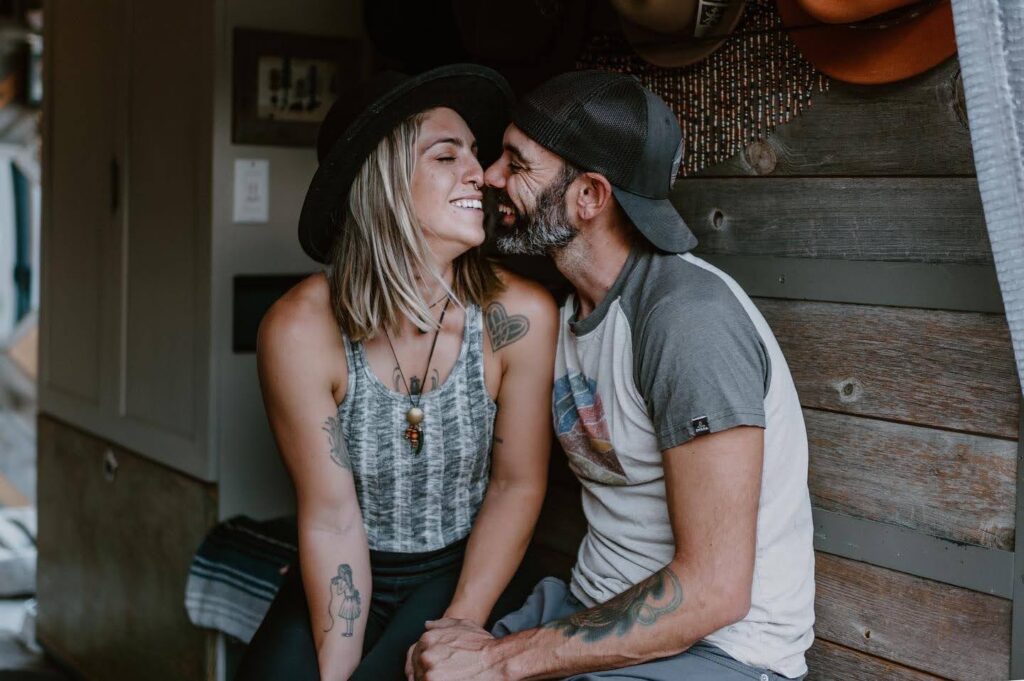
CONS
Friendships
The downfall of always being on the move is holding onto steady friendships and building more memories together. We feel like we do pretty good with spending quality time as we can get it with our friends, but we know if we lived in one spot we could have more of that. On the flip side, our friend circle is pretty big as it reaches across the states and we may get to see people we wouldn’t otherwise see. It’s a toss-up.
GYM—One thing we really miss about being stationary is having a gym membership where we saw a lot of our friends. A lot of nomads are members of Planet Fitness because it’s cheap, it’s widespread across the states and they can take advantage of their hot showers. For us, we don’t want a regular gym membership. We want a membership to a climbing gym. There are no large chains of climbing gyms that you can be a member of and find across the states as you travel. With climbing, it’s important to have consistency to sustain strength and to see any growth. We miss our routine not only for staying strong but climbing every evening with the same friends and the camaraderie. Climbing is more fun with other people (it’s why we love bouldering) and it’s even more fun with people you know.
Work
This lifestyle is less stressful in comparison to our lives before with regular jobs working for someone else full time. On the other hand, I still find myself a bit stressed between jobs. I fear we won’t find another client that aligns well with the location we are in or want to be. I get worried we won’t find another person interested or able to afford our services. It has always somehow worked itself out with minimal effort on our part to share where we are or where we are going. We’ve also been very lucky with the clients who have found us. They have all become friends and have been a blast to hang out with while working with them. Finding work on the road or finding remote work, is a huge topic for nomads. This is something very important to have figured out before moving into your van full-time to travel. Another option is to live in your van while parked in town and still work a regular job. You’ll save money on gas by not commuting and you’ll save by not having a rent payment. We did this for six months and were able to save money to use towards living on the road for over a year.
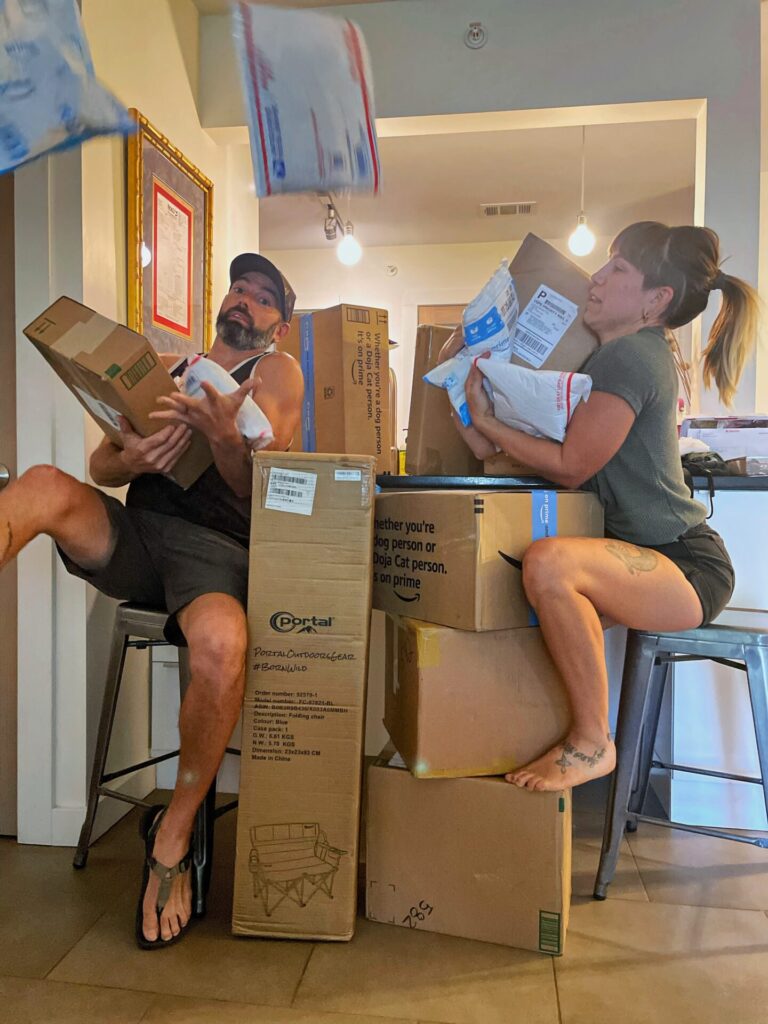
You’ll have a bit of a struggle figuring out where to send your mail. There are certain things you’ll need a permanent address for such as car insurance, health insurance, banking, driver’s license, etc. We have our permanent mailing address set up to be sent to a family member’s house. Then we ask them to send us photos of things that look important. If we need the item, we ask our family members to forward it to us wherever we are. This forwarding address has been a friend we are visiting, a different family member, a temporary mailbox, or a local post office. These options have worked for any gifts that are sent to us as well. For ordering packages from Amazon or other businesses we have used a mix of those options or other options such as Amazon locker or UPS store. This takes some figuring out beforehand and double checking the address is correct and not automatically going to be sent to your permanent address by default.
One helpful thing to know is that if the shipper is sending you mail USPS from the post office, they can address it to you with an address of “general delivery” with the zip code to whichever location is close to you. They will hold the mail for you for a certain amount of time and allow pick up during specific days and time frames. They will not notify you of a package being delivered so you will have to check or have a tracking number to find out for yourself. We have done this at UPS stores as well, but called ahead to that location to confirm we could send something there for pick up.
Mechanic
One of the biggest fears while living on the road is having your vehicle break down. Finding a trustworthy mechanic while you travel can be extremely challenging. Typically, you don’t look for this service until you desperately need it. You won’t be seeing the same person and building that relationship. You might not be able to get in right away or feel comfortable explaining easily that you live in your rig and cannot be without it for an extended amount of time. It would be wise to make a habit of researching places and saving them as you travel to reference back to if needed. You’re able to add these into the app we mentioned earlier, Sekr, refer back to them as needed, or see ones that others have added.
Necessities
Finding needed necessities is always a bit of a challenge, but will hopefully get easier over time through crowdsourcing and the use of nomad apps. Since we live full-time in our van and have a limited amount of space and resources, many things need to be replenished quite often. For instance, we need to find things such as a large dumpster for our waste. Most are locked or you feel like you’re breaking the law by putting anything into one. We need to find a spigot close enough to park near to refill our water tank with a hose. This has been the trickiest thing yet. Somehow we’ve always found a way. The longer you’re on the road, the more brave you get to pirate a spigot or simply ask to use one. You can ask places such as gas stations or oil change shops if you can use their spigot to refill your water jug. Oftentimes, they say yes. If we haven’t found a spigot specifically, we’ve used a jug or shower bag in a shopping cart and made multiple trips in and out of a grocery store for a paid water refill station. Another thing we’re on the lookout for from time to time is a propane fill station. We don’t have a BBQ exchange-size tank. We have an under-mount tank that we need to have manually refilled by a technician. We can usually find this at a specific store that sells it, such as a gas station, U-Haul, or Tractor Supply.
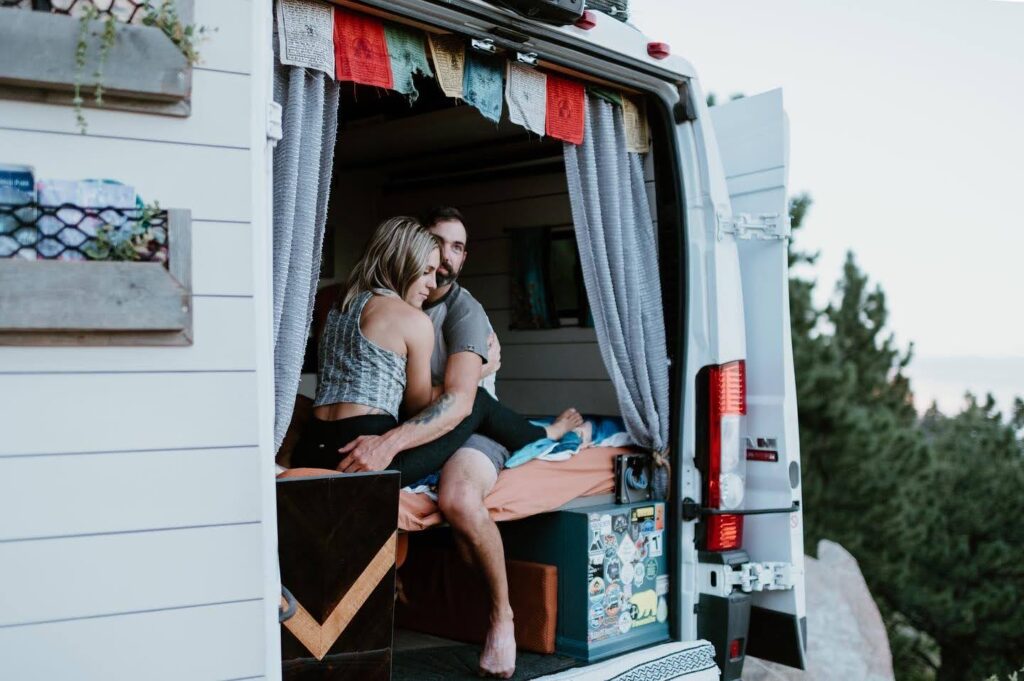
Final Thoughts
These are the pros and cons that come to mind in our last three years living in a van full time. For others, there may be more or less depending on their build and lifestyle. Although stressful at times, none of these cons are deal breakers. We love the way we live and every effort is worth the reward. We’ve created a home inside a van that’s all our own. We’ve incorporated all our favorite things and held onto hobbies we enjoy. Living this life has allowed us to travel the U.S. full-time. We’ve even created a business that allows us to make an income while having the freedom to move around as much or as little as we feel like at any given moment. We hope we helped you with some insight and things to think about when planning your own build and considering living this lifestyle full-time. Prioritize your happiness and create a space that’s all your own, or allow it to create it for you along the way.
Learn more from Crux and Beta
You Bought a Van—Now What? with Crux and Beta
Why We Bought a New Van For Our Home On Wheels with Crux and Beta






